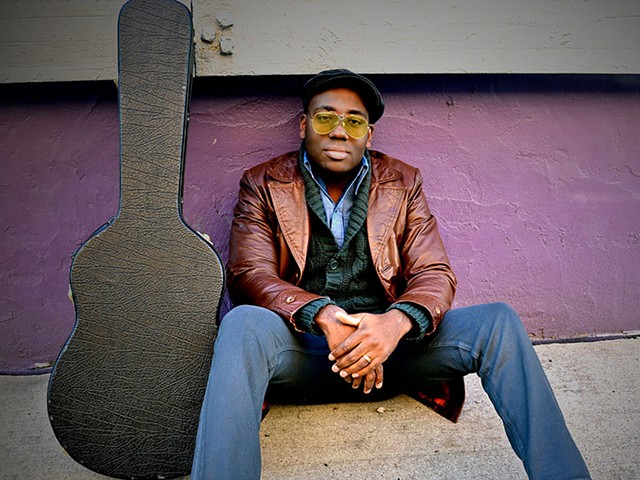In January, music group 47Soul played a homecoming show at the Portico Resto-Pub in the trendy Jabal Al Weibdeh neighborhood in Amman, Jordan.
Fresh from their first U.S. tour, the politically tinged Palestinian-Jordanian group played three sold-out shows over two nights. The audiences included parents with toddlers and teens, sweaty pockets of dabke dancers, and hip young adults twirling prayer beads or black-and-white checkered keffiyeh scarves.
Back on familiar turf after an extended absence, these triumphant gigs had the air of a party — or, more accurately, of a family reunion. But that familial vibe seems to follow 47Soul wherever they play, says Ryah Aqel, curator of education and public programming at Dearborn's Arab American National Museum, where 47Soul will perform on Friday, March 8.
"I've seen videos of their concerts in Palestinian communities," Aqel says. "It's like the crowd is dancing at their own wedding. That's how excited people are about them."
47Soul guitarist Hamza Arnaout says the group's shows all over the world serve as a magnet for members of Palestinian diaspora who seek connection.
"It's like a piece of home when you play for these communities," Arnaout says. "It's always overwhelming to go places around the world and discover that you're meeting a third- or a fourth-generation Palestinian Chilean that you've never heard of, and building all these connections. It's definitely a big part of our shows."
47Soul plays an infectious style they call shamstep — a shout-out to Bilad al-Sham, the Arabic name for the Levant. The music combines dabke and dancehall beats, with percussionists Tareq Abu Kwaik and Walaa Sbeit providing propulsion. Arnaout plays slashing counterpoint to synth player Ramzy Suleiman's frenzied electro-mijwiz freakouts.
The group's bilingual Arabic-English lyrics place their strong political stance in the foreground. 47Soul's music deals with the aspirations of displaced people — Palestinians and others — as well as a broader message of freedom and human rights.
Arnaout says the political content in 47Soul's music is a natural response to the group's quotidian existence, in which their very Palestinian identity is controversial.
"It's just a reflection of our daily reality that we live as Palestinians or Arabs, Arab youth living in the Arab world," Arnaout says. "It is definitely something that you cannot just look away from if you want to express yourself, lyrically and musically, to the fullest."
But if having a strong political consciousness is an inescapable part of being part of the Palestinian diaspora, one of the strengths of 47Soul's music is that their political themes are usually part of the context, rather than the subject of overt preaching.
"I'm not sure I'm a big fan of the idea of separating politics from music, because politics is just like a mirror for your daily life and what's happening," Arnaout says. "It doesn't mean that you are reflecting about the parliament or a certain institution in your country. It could be something way bigger than that. Maybe you're discussing the education of the youth. Maybe you're discussing women's rights. Maybe you're discussing a lot of other issues."
It might verge on cliché to point out that the personal is the political, but Abu Kwaik says it's all intertwined.
"I use politics for political reasons, and I use them for very human reasons," Abu Kwaik says. "And I do human things that I don't call politics, that end up being called politics."
Ultimately, Abu Kwaik acknowledges, "I do admit I've failed to make a very personal song."
Aqel says it would be hard for a group like 47Soul to separate the music from the message.
"When you have marginalized communities who are essentially struggling to exist, all of their cultural production is going to have an element of the political in it," Aqel says.
Aqel stresses the importance of bringing artists like 47Soul to the AANM, which serves many communities struggling with estrangement from their original homes.
"I think many people in diasporic communities spend much of their time feeling alien in the space that they exist in, and that is no small thing," Aqel says. This makes it all the more important for members of those communities to see these ancestral homes represented in the AANM's programming.
47Soul arose from Amman's alt-music scene in 2013. Arnaout was a founding member of Autostrad, while Abu Kwaik was in El Morabba3 — two of the better-known groups on the Amman scene. All four are Palestinian, but grew up in different places. Arnaout and Abu Kwaik have Jordanian nationality; Sbeit carries an Israeli passport; Suleiman is an American citizen, born in Washington, D.C.
The group relocated to London several years ago — a move that inspired some themes on 2018's Balfron Promise. While the move was originally a solution to the logistical problems of working together, they now consider London home.
"We're not in London now because we can't be somewhere else. We're in London now because it's special to us," Arnaout says. "We're a Palestinian-Jordanian band that was nurtured in London.
In January, 47Soul played their first U.S. dates on the East Coast, after scrapping a 2016 tour when Sbeit's visa was denied. The band's January performance at New York's Globalfest earned enthusiastic plaudits in Rolling Stone and The New York Times. The AANM show is part of a seven-date U.S. tour that also includes a gig on a Creem magazine showcase at SXSW in Austin, Texas.
47Soul performs with special guest Tammy Lakkis on Friday, March 8 at the Arab American National Museum, 13624 Michigan Ave., Dearborn; 313-582-2266; arabamericanmuseum.org; Doors at 8 p.m.; Tickets are $10 for museum members, $12 students and seniors, and $15 for the general public.
Get our top picks for the best events in Detroit every Thursday morning. Sign up for our events newsletter.







